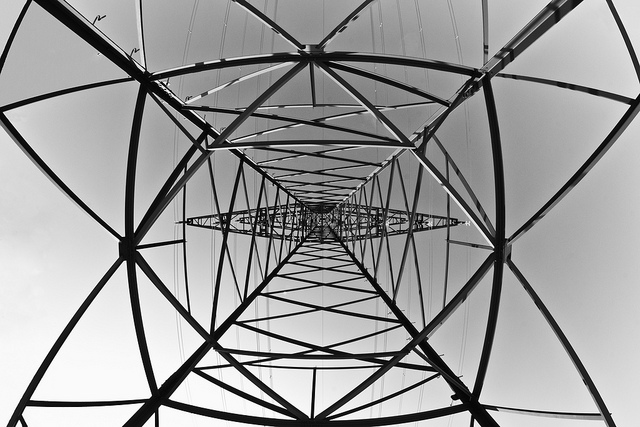The Ontario 2015 budget had more than a plan to put beer and wine in grocery stores. The Ontario Liberals are trying to sell off 60 per cent of the publicly owned electricity transmission and distribution company Hydro One.
Critics of the plan say that privatizing the massive network of transmission lines and stations means trouble for workers, the environment, and an already cash-starved province.
Privatization could mean Big Energy agenda
Both the Ontario New Democratic (ONDP) and Progressive Conservative parties have been highly critical of the Liberal plan. Peter Tabuns, MPP for Toronto-Danforth and the ONDP Critic for Energy, argues that the 60 per cent sell-off will harm rate-payers.
“The new Hydro One will be far more focussed on rate of return, so I expect that prices for electricity will go up. The cost of hydro is already becoming a substantial problem for people across Ontario.”
In defending the plan, Premier Kathleen Wynne has repeatedly argued that regardless of the partial sale of Hydro One, the existing regulations on setting the price of electricity will remain in tact. The Premier has also pointed to stipulations in the sale which preclude ownership of more than 10 per cent for a single owner.
Tabuns remains unconvinced that these measures will be enough to stop large energy trading companies from buying up and imposing their will on Hydro One and the province. He says the sale will likely attract some of the biggest multinational energy players around and they don’t play nice with regulation that’s against their bottomline.
“When you’re going to have some of the biggest energy companies in north america controlling our grid, they are not going to sit by idly and let a regulator mess with them. We’ve seen time and again in other jurisdictions, private utilities have been able to capture their regulators.”
Along these same lines, Tabuns thinks that once Hydro One is largely out of public hands, it will be that much more difficult to develop a more sustainable electricity grid.
“In other jurisdictions, privately owned electricity grids are not very friendly towards conservation and solar because it negatively impacts their marketshare. Why on earth is Hydro One — with investors looking to maximize profits — going to be any different?”
Is it really Hydro One or transportation infrastructure?
Another consistent Liberal response to criticisms of their partial Hydro One sale, is that without selling 60 per cent of the publicly owned company, it won’t be possible to make critical investments in Ontario’s roads, rail, and transit infrastructure.
Hydro One’s assets, including more than 150,000 km of transmission lines and 290 transmission stations, are worth $22 billion. After costs, the Liberals are expecting that the majority sale of Hydro One will bring in $4 billion (or less than 15 per cent) of the $31.5 Billion investment the Liberals have earmarked for new infrastructure spending.
If clearing $4 billion after selling a majority share of a $22 billion company seems a little a low, you might want to take it up with the financial industry on Bay Street. As reported in rabble already, a significant portion of the revenue created from the Hydro One sale will go into the pockets of financial firms facilitating the initial public offering (IPO).
In 2002, when Ontario’s Progressive Conservative government looked to privatize Hydro One, the company had around $13 billion in assets. At the time, Bay Street firms were desperately trying to get a piece of the estimated $110 million fee for facilitating the IPO.
With Hydro One now worth almost double what it was in 2002 it’s probable that Bay Street’s fee will be much higher, and is likely to be paid for by rate-payers and tax-payers.
But how did Ontario get to the point of where the province is looking to move its assets with little return to pay for infrastructure? Tabuns says Liberals have imposed significant challenges for Ontario’s finances, in part because of their reluctance to tax corporations responsibly.
“They have engaged in an ongoing process of cutting corporate taxes and shifting the responsibility for taxes from corporations to individuals. So first they create a cash shortage and then say ‘hey, we’re short of cash. Now we have to do something radical like sell off Hydro One and other public assets.'”
Privatization creates divisions in labour
The response of labour unions to the Hydro One selloff has been mixed. While the Power Workers Union, representing thousands of workers at Hydro One was initially running anti-privatization radio ads, according the Premier Wynne, the union now supports the privatization so long as the company remains intact.
A Globe and Mail article in March suggested that both the Power Workers Union and the Society of Energy Professionals — each representing thousands of workers at Hydro One — were negotiating with the province for an ownership stake in the 60 per cent offering.
While the Society of Energy Professionals declined to comment for this story, the union, working with CUPE Ontario, has launched a series of radio and print ads opposing the privatization of Hydro One. Likewise, the ONDP has started a campaign to foster opposition to the plan.
Against selling off Hydro One? Sign this petition now!
Steve Cornwell is interested in social movements, science and technology. Steve has worked on energy issues with Greenpeace Canada, Environmental Defense, Safe and Green Energy Peterborough, and SumOfUs.org. Find him on Twitter @steve_cornwell
Photo: flickr/ Markus Grossalber



